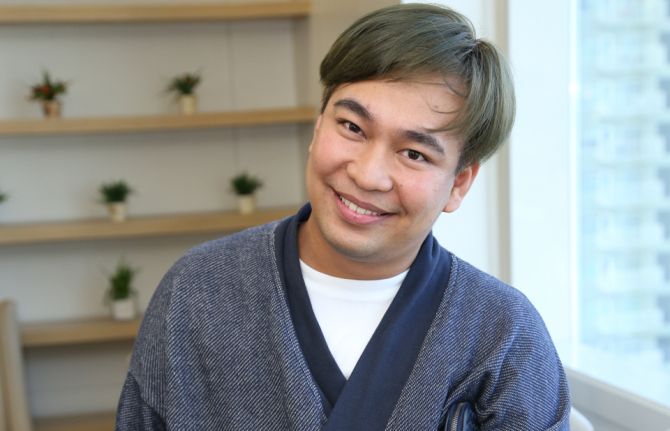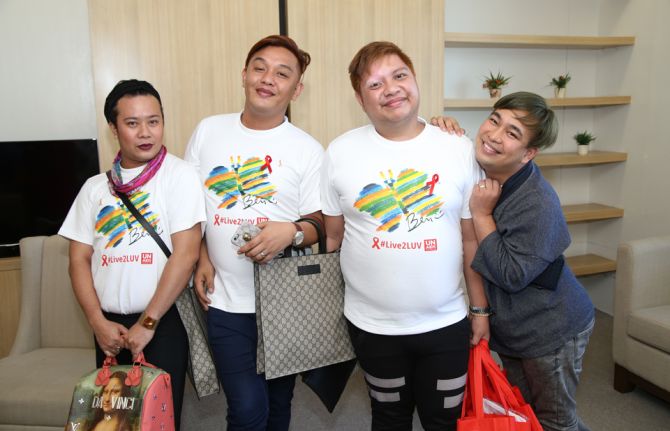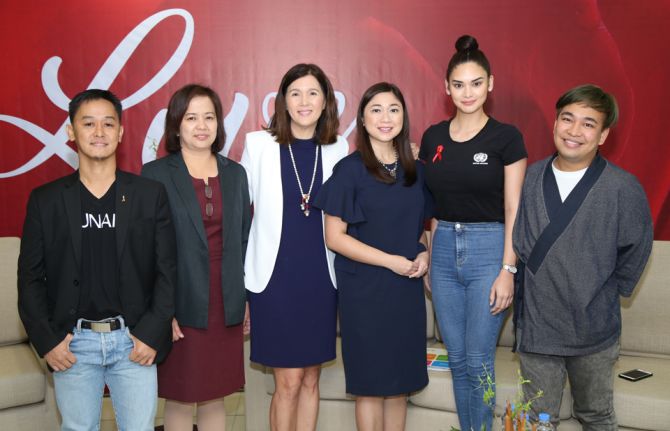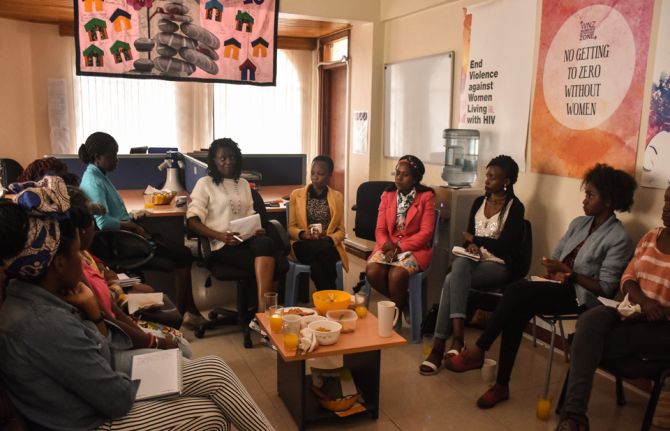



Update
Grassroots hero: thinking out of the box by mixing health and fun
15 August 2017
15 August 2017 15 August 2017There is a quiet hum in the room from the mostly young men sitting in chairs, eyeing their smartphones and chatting. Suddenly, a cheerful figure bursts into the executive lounge of the high-rise building in Taguig City, Philippines.
“Thank you, thank you,” said Ronivin (Vinn) Garcia Pagtakhan, the Executive Director and Founder of LoveYourself, a community-based organization providing health and empowerment services to men who have sex with men and transgender people. The team were wrapping up after a major event promoting HIV testing.
Mr Pagtakhan, with his shock of brown hair, frosted with a light green tint, bounced from one group to the next, joking and repeating his thanks.
Almost everyone here is a volunteer,” explained Mr Pagtakhan. “I get really moved when I talk about my volunteers. I owe everything to them.”
LoveYourself provides HIV testing and treatment services, as well as oral pre-exposure prophylaxis (PrEP) and tuberculosis screening. It has 25 staff members, who are supported by around 800 volunteers. Mr Pagtakhan founded LoveYourself in 2011, modelling it on a lesbian, gay, bisexual and transgender youth centre he volunteered in while living in San Francisco, United States of America.
“At the time, I felt there was a real problem with the way we were handling HIV prevention among the gay community in the Philippines,” said Mr Pagtakhan. “It was all about fear. I wanted something more optimistic and encouraging. I wanted a place that was lively, where people would want to hang out.”
He was only 25 years old at the time. “As they say, I know my market, because I am part of the community.”
He graduated from nursing school in the Philippines when he was 18 and got the fourth highest score on the national nursing board examinations. “This meant that I was in high demand by other candidates as a teacher helping to prepare people for their licensing exams. I travelled around the Philippines giving classes and I used social media to reach out to students as well,” said Mr Pagtakhan.
He became a celebrity on social media, with 600 000 followers on Twitter, and won the prestigious international Twitter Shorty Awards as the Nurse of the Year. The prize money helped start LoveYourself.
“The first three years, it was like sending your child off to college. I basically supported the organization on my earnings. We didn’t have any donors,” said Mr Pagtakhan. “I like to think out of the box and I had a particular vision. I didn’t want grants to dictate what we did or became. I wanted to create ripples of positive change in the community. LoveYourself isn’t just about HIV, but rather about increasing a person’s self-worth.
The organization has three community centres in the Manila, Philippines, area offering HIV testing and other services. Anyone can drop in, even on the weekends and in the evenings, for free health services.
LoveYourself tested about 20 000 people in 2016 and diagnosed around 1500 new HIV infcetions, which represent around 50% of the newly diagnosed HIV cases reported by the Department of Health in Manila. LoveYourself also works with companies and schools to help them develop HIV policies and to conduct on-site HIV tests.
In July, the organization began piloting PrEP and with support from UNAIDS and the World Health Organization plans to start a demonstration project offering self-testing before the end of the year.
In just six years, LoveYourself has grown to become an important HIV service provider in Manila. Mr Pagtakhan is proud of the organization’s achievements and has bigger ambitions. “We are still renting. I want LoveYourself to own a place, which is a community centre, where we can have health services but also original events and activities,” he said.
For more information on LoveYourself, go to http://www.loveyourself.ph.
Resoures
Region/country


Update
Florence Anam’s mission: giving young people a reason to live
13 June 2017
13 June 2017 13 June 2017GRASSROOT HERO SERIES
UNAIDS brings you stories of people on the ground bringing about change in the AIDS response. We thank them for being unsung heroes. AIDS is not over, but it can be.
A gaggle of girls shuffle into Florence Anam’s office for their monthly mentoring chat. She has put out snacks and assembled chairs in a circle. To get the conversation started, she asks the 16 girls to describe their happiest memory and their saddest moment and what their actions were at both of those times. A few describe their carefree childhoods and their world crumbling when they found out they were living with HIV.
Ms Anam, who works for the International Community of Women Living with HIV in Kenya, sees a pattern after about five responses and asks, “Who has felt so low that they wondered if they could carry on?”
Fifteen of the 16 girls raise their hands.
“I am so disturbed to see how young people are so depressed and how this will affect them in their adulthood,” she says. “We need to give our kids a reason for living.”
Her determination is deeply rooted.
Eighteen years ago, at the age of 19, Ms Anam became pregnant. As a teenager she had been flattered by an older man showering her with attention. A good student in school and just about to start university, her parents told her that they were disappointed in her, but never brought up the subject again.
“When I was pregnant, there were never any questions of how I got in this situation or who was responsible,” Ms Anam said. “Sex was a taboo topic and not a discussion that parents had with their children.”
Her mother took her to a clinic, and she describes being stared at. At the time, she thought the doctor was probably wondering how such a young woman could be pregnant, but she now thinks they were hiding things from her.
“The health system, I believe, was not equipped to deal with young people like me at the time. I remember the staff talked to my mother more than me,” Ms Anam says.
Ms Anam thinks the doctors informed her mother that she was HIV-positive, although they didn’t tell Ms Anam that she was. She recalls her mother telling her to stop breastfeeding her baby son, although the teenage girl just thought it was because she had to go back to school, which she did seven days after delivering her baby.
In 2006, during a national Kenyan HIV prevention campaign, she and four other friends went to get tested. “I wanted to prove people wrong and wanted to just come out of that testing centre and scream I was HIV-free,” she says. When the HIV tests confirmed she was living with HIV, she was shocked.
Ms Anam says the real impact of her HIV-positive status came a year later, when she needed to get an HIV test to qualify for health insurance at a new job. The day the results came back, she had a termination letter on her desk.
“It hit me that I would not achieve my dreams, I felt really sad that all the dreams my parents had for me could not come to pass because I was not going to be able to work,” Ms Anam says. “I sank into a hole.”
She stopped socializing, distanced herself from her family and felt utterly lost and angry.
“Back then, there were no HIV networks for young people, neither was there as much information available, so I contacted a woman who had been featured in a newspaper and lashed out at her, asking, “Why am I not allowed to be productive if I am not sick yet?”” explains Ms Anam.
The woman, Asunta Wagura, happened to be the Director of the Nairobi-based Kenya Network of Women with AIDS. Ms Wagura asked her to come in and see the organization, for which Ms Anam then started volunteering. She describes the experience as a serious reality check. She heard other women’s stories, of how many of them lived in poverty and dealt with violence.
“It was like plunging into this world that as a protected child I never even knew existed; all of a sudden my problems became trivial and I knew I needed to let other people know what I was seeing every day.”
She also became more vocal about HIV, bringing a lot of attention to herself and her status.
“I was done with having people dictate to me what their opinions about my life were, I missed the girl that I was and I desperately needed to get out that hole,” she says.
Over time, she learned to take control of her life.
“Part of my family was supportive, but another looked down upon my decision,” Ms Anam explains. “When my sister said to me that I had found a purpose, I did my first media interview.”
And she never looked back.
The turning point for Ms Anam came when she realized that she too had a story to tell and so she started writing. It was not only therapeutic—it inspired others.
She accompanied Ms Wagura and spoke to her peers.
It is that mentorship that Ms Anam says enabled her to grow to be the person she is today.
She started a support group of young people in 2008 and the members continue to be a part of her life.
Ms Anam worked in the private sector in an HIV workplace programme, where she implemented strategies for HIV prevention and expanding health services. “These were the best years, because I was able to go back to the system that had shown me what stigma could lead to and I helped fix things.”
She then joined the Kenya Empowerment Network of People Living with HIV to coordinate a national advocacy and communication portfolio. Now working in advocacy and communications for the International Community of Women Living with HIV, she considers that she lives a full life and is bringing up her 17-year-old son and 11-year-old adopted daughter. They chide her for bringing up sex and other “awkward” subjects at the dinner table.
“I am like the weird mother speaking about sex and responsible sexual behaviour in the most insane places,” Ms Anam says. “I keep repeating to them that decisions you make now, however immature, will have a long-term impact.”
“I want to raise their consciousness regarding their life 20 years down the road,” Ms Anam says. She tells young people that she is one of the lucky ones, because she bounced back.
She also believes that families and communities need to better address the needs of 19–24-year-olds and encourage an open dialogue and mentorship.
Ms Anam thinks that parents believe that once their children get to 18 they are okay and do not need any guidance and support, yet many mistakes are made after that age. Ms Anam explains that young people need to love themselves and appreciate that, whatever experiences they go through, it’s a lesson for life.
Helping others gives her a purpose. In addition, she adds, “I want to stop one more person going through what I went through, and if they have gone through the same thing, then I want to help them get their life back on track.”






